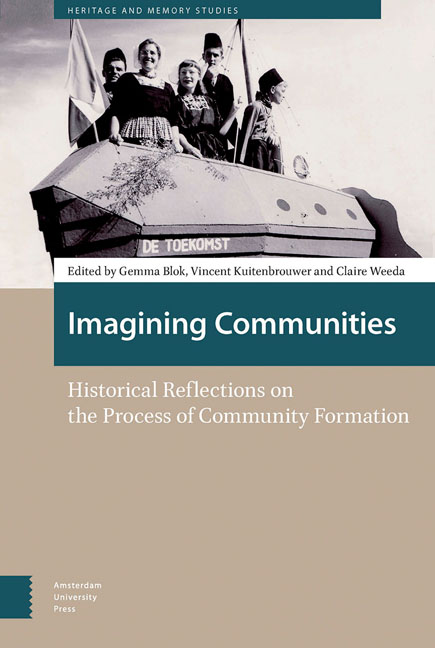Book contents
- Frontmatter
- Contents
- List of Figures
- Introduction
- 1 Meanwhile in Messianic Time: Imagining the Medieval Nation in Time and Space and English Drinking Rituals
- 2 Diverse Origins and Shared Circumstances: European Settler Identity Formation in the Seventeenth-Century Plantation Colony of Suriname
- 3 Imagining Europe: The Peace of Ryswick (1697) and the Rise of European Consciousness
- 4 Gypsy Music and the Fashioning of the National Community
- 5 ‘Tired, Worried and Overworked’: An International Imagined Community of Nervous Sufferers in Medical Advertisements, 1900-1920
- 6 ‘From Heart to Heart’: Colonial Radio and the Dutch Imagined Community in the 1920s
- 7 Indonesian Nationalism in the Netherlands, 1920s-1930s: Long-Distance Internationalism of Elite Pilgrims in Homogeneous, Empty Time
- 8 Time, Rhythm and Ritual: Imagined Communities in L’espoir (1937) and Les sept couleurs (1939)
- 9 Stamverwantschap and the Imagination of a White, Transnational Community: The 1952 Celebrations of the Jan van Riebeeck Tercentenary in the Netherlands and South Africa
- 10 ‘L’Oranie Cycliste, une grande famille’: Recycling Identities and the Pieds-Noirs Communitas, 1976-2016
- 11 Remembering and Imagining the National Past: Public Service Television Drama and the Construction of a Flemish Nation, 1953-1989
- Index
6 - ‘From Heart to Heart’: Colonial Radio and the Dutch Imagined Community in the 1920s
Published online by Cambridge University Press: 11 December 2020
- Frontmatter
- Contents
- List of Figures
- Introduction
- 1 Meanwhile in Messianic Time: Imagining the Medieval Nation in Time and Space and English Drinking Rituals
- 2 Diverse Origins and Shared Circumstances: European Settler Identity Formation in the Seventeenth-Century Plantation Colony of Suriname
- 3 Imagining Europe: The Peace of Ryswick (1697) and the Rise of European Consciousness
- 4 Gypsy Music and the Fashioning of the National Community
- 5 ‘Tired, Worried and Overworked’: An International Imagined Community of Nervous Sufferers in Medical Advertisements, 1900-1920
- 6 ‘From Heart to Heart’: Colonial Radio and the Dutch Imagined Community in the 1920s
- 7 Indonesian Nationalism in the Netherlands, 1920s-1930s: Long-Distance Internationalism of Elite Pilgrims in Homogeneous, Empty Time
- 8 Time, Rhythm and Ritual: Imagined Communities in L’espoir (1937) and Les sept couleurs (1939)
- 9 Stamverwantschap and the Imagination of a White, Transnational Community: The 1952 Celebrations of the Jan van Riebeeck Tercentenary in the Netherlands and South Africa
- 10 ‘L’Oranie Cycliste, une grande famille’: Recycling Identities and the Pieds-Noirs Communitas, 1976-2016
- 11 Remembering and Imagining the National Past: Public Service Television Drama and the Construction of a Flemish Nation, 1953-1989
- Index
Summary
Abstract
This contribution analyses the symbolic meaning of the first short-wave radio connection between the Netherlands and the Dutch East Indies, which was established in 1927, as a means to overcome the distance between the colonial centre and periphery. This chapter explores primary source material about colonial radio to reveal the transnational aspects of the Dutch imagined community. Contemporaries marvelled at the wonders of radio technology as they listened to voices from the other side of the world. Such experiences forged a stronger sense of unity between the Netherlands and the Dutch East Indies as distance seemed to fall away. Moreover, these first contacts triggered emotions on both sides of the line, feelings that were expressed in different media genres and became part of Dutch popular culture.
Keywords: imagined communities, Dutch East Indies, colonialism, international radio broadcasting
The first half of the twentieth century stands out as a crucial phase in Dutch state-building, in various parts of the world. During this period the Netherlands became a strong national community with the different provinces bound together by a tight infrastructural grid and a range of invented traditions.At the same time the Dutch authorities also tightened their grip on the overseas dependencies. The colony in the Indonesian archipelago in particular underwent some major transformations following territorial expansion, the creation of new political institutes and the development of (intercontinental) communication lines. These processes of state-building, in the metropole and the periphery, to a large extent depended on the development of modern technology. The interaction between these two variables, state-building and technology, is central to this contribution, which specially focuses on the development of radio as a medium connecting the Netherlands and the Indies.
One important argument in Benedict Anderson's Imagined Communities is that print-capitalism, in the form of the newspaper press, played a crucial role in state-building as it ‘represents the kind of imagined community that is the nation’. By emphasizing the power of the media on human society, Anderson to an extent followed the work of Marshall McLuhan, who coined the famous phrase that ‘the medium is the message’. McLuhan argued that in order to understand media one should not study the content, but rather the form. Technology, he asserted, ‘shapes and controls the scale and form of human association and action’.
- Type
- Chapter
- Information
- Imagining CommunitiesHistorical Reflections on the Process of Community Formation, pp. 113 - 130Publisher: Amsterdam University PressPrint publication year: 2018



